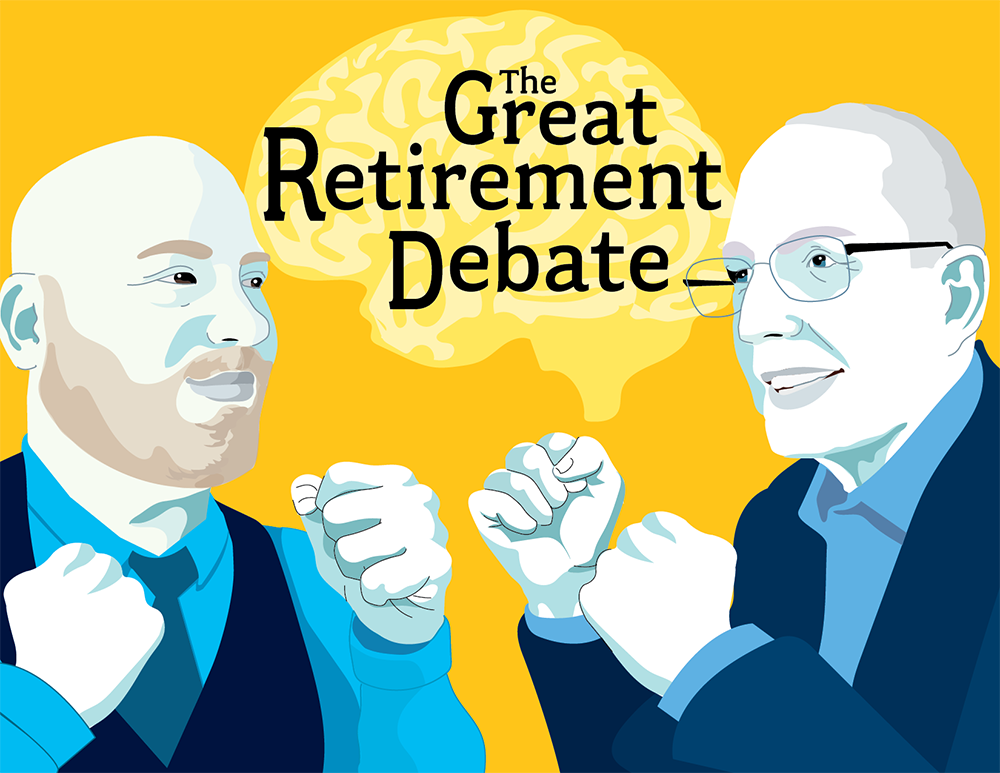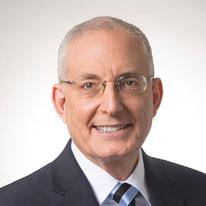In this episode of the Great Retirement Debate, Ed and Jeffrey discuss whether you should convert or not convert your IRA to a Roth IRA.
[00:00:00] Intro: Hi, I’m Ed Slott, and I’m Jeff Levine. And we are two guys who just love to talk about retirement and taxes. Look, our mission is simple to educate you, the savers, so that you can make better decisions because better decisions on the whole lead to better outcomes.
[00:00:14] Intro: And here’s how we’re going to do that.
[00:00:15] Intro: Each week, Jeff and I will debate the pros and the cons of a particular retirement strategy or topic with the. Helping you keep more of your hard-earned money. Yeah, but we won’t know which side of the debate we’re taking until we flip a coin winner of the coin flip gets to pick which side of the debate they want to argue, and both of us will have to argue in favor of our respect positions, whether we agree with them or not.
[00:00:40] Intro: At the end of each debate, there’s going to be one clear winner you, a more informed saver who can hopefully apply the merits of each side of the debate to your own personal situation to decide what’s best for you and your family.
[00:00:52] Intro: So here we go. Welcome to the Great Retirement Debate.[00:01:00]
[00:01:02] Jeffrey Levine: Hello everyone, and welcome back to the Great Retirement Debate. Ed, how’s it today?
[00:01:07] Ed Slott: It’s going great. I have a great topic, actually. We’re going to break one of our usual rules on this one. Uh, we generally stay away from politics and religion, but this will be a religious thing to convert or not to convert.
[00:01:22] Jeffrey Levine: Oh yeah, there are definitely some people who feel pretty, pretty feel pretty passionate about that. Conversion is a religion for some. Oh, wow. All right. Big topic today at a meaty topic. Uh, I, uh, I get to, I guess I get to pick the coin flip again today. So I’m gonna go with tails once again.
[00:01:38] Ed Slott: Ahh, Here we go.
[00:01:41] Ed Slott: What is it? Uh, tails again. You’re on a winning streak from the last few. And just so we’re clear, convert, we’re talking about converting your IRA to a Roth IRA, which may be a religion for some people.
[00:01:52] Jeffrey Levine: You know, this is one of those things, Ed, that has, uh, lifelong ramifications. We’re talking about taking an account that, uh, [00:02:00] as you often say, is forever taxed, uh, to an account that is never taxed.
[00:02:04] Jeffrey Levine: I can’t help it, Ed. I, I am gonna, you know, I, part of me wants to, to leave you with the, uh, the option to convert, but, I gotta argue in favor of conversion. I’m gonna leave you with the don’t convert argument on this one. I’m sorry, but I think you’re getting the short end of the stick today.
[00:02:18] Ed Slott: Oh, yeah, yeah, yeah, yeah.
[00:02:19] Ed Slott: Everybody knows I’m a big Roth fan, but again, there’s two sides to everything, and that’s the purpose of what we’re doing to give you the pluses, the minuses, the benefits and drawbacks so you can make the decision that’s best for you. Nothing is all black and white. Some things are gray. There’s no decision even with my favorite decision to convert to a Roth. There are reasons not to.
[00:02:41] Jeffrey Levine: Such as?
[00:02:42] Ed Slott: All right. So i’ll start it. Nobody wants to pay the tax. Okay. Uh, , if your hand starts shaking when you find out what it’s going to cost, and you do have to pay the tax when you convert from an IRA to a Roth IRA, that’s what we’re talking about from Forever Tax to Never Tax.
[00:02:59] Ed Slott: Everybody wants to [00:03:00] get to the Promise Land, never tax, income tax free for life. But there’s a price of admission. There’s no question. The Roth IRA is the best retirement account to own. The only question is how much are you willing to pay for it, like anything else. So, uh, that’s one of the reasons some people just don’t like paying tax before they have to.
[00:03:22] Ed Slott: In fact, Jeff, you and I as CPAs both know, we were both trained as accountants to never. Ever. Pay a tax before you have to always defer, defer to put it off. So here, uh, you, you can defer and keep deferring it and you won’t have to pay anything upfront. Uh, if you don’t convert.
[00:03:42] Jeffrey Levine: Well, that’s a good argument.
[00:03:43] Ed Slott: One arguement for not converting. I have others.
[00:03:45] Jeffrey Levine: All right, well, well, we’re good. It’s gonna take more than that Ed, to, to win this argument cause I got a lot of ammunition on my side today. In fact, you know, you talked about deferring, deferring, deferring, which is, which is great, but you don’t get to do that forever.
[00:03:57] Jeffrey Levine: There’s a time when, whether or not you [00:04:00] wanna defer, you don’t get to choose that. It’s time to pay the piper. Such a time is called the required beginning date, that is the time when you need to start taking required minimum distributions. And as we sit here today, Ed, you know that’s, that’s recently changed.
[00:04:14] Jeffrey Levine: The Secure Act took us from age 70 1/2 to age 72. More recently, secure Act 2.0 moved that back to 73 for roughly the next decade, then to age 75. But even at that age, many people still live beyond it, you know, into their 80s, 90s, and sometimes even beyond that.
[00:04:33] Jeffrey Levine: And at all those more advanced stages, people must begin taking required minimum distributions from their IRAs, even if they’re still working. If the money is in an ira, it doesn’t matter whether you’re working or whether you’re not. You must take required minimum distributions from your IRA accounts.
[00:04:55] Jeffrey Levine: And here’s the thing, some people are so [00:05:00] good at saving. And so bad at spending, that they end up with a lot more money than they ever thought they’d have and that they ever would need. Now admittedly, this is a very first class, uh, problem to be dealing with, right? I have too much money and too much income.
[00:05:17] Jeffrey Levine: But for some folks, once those required minimum distributions kick in, Between those distributions that they have to take between their social security income, between their interest and dividends and capital gains they may have from taxable investments. For some folks, God forbid, a pension, you know, something like that, will all of these individuals and these incomes come together and they can pour somebody into a much higher tax rate in retirement when they’re not working and not earning than they ever had while they were working and actually trying to make a living.
[00:05:53] Ed Slott: Uh, yeah. You mentioned one thing. I wrote that down. How do you spell that word? You said pensions. What was that? [00:06:00]
[00:06:00] Jeffrey Levine: It’s this, uh, it kind of, uh, like you know how the dinosaurs were a historical artifact? Well, pensions came along shortly after the dinosaurs ended.
[00:06:11] Ed Slott: Yeah. Right.
[00:06:11] Jeffrey Levine: And much like the dinosaurs, they went away very quickly in kind of a flash. Yeah. Yeah. Very few people that.
[00:06:18] Ed Slott: It was a check. I don’t understand. These companies, they just gave X employees money every month for the rest of their lives. They weren’t even working anymore. All right.
[00:06:27] Jeffrey Levine: Then the internet came along and everything went away.
[00:06:29] Ed Slott: Yeah.
[00:06:31] Ed Slott: Yeah. Alright, so here’s some other reasons you may not want to convert and to be clear, and Jeff has to agree with this. Uh, we’re not that he has to, but I think he will. We’re not talking about all or nothing. A conversion can be partial conversion, so there’s some middle point, you know, uh, maybe smaller conversions.
[00:06:49] Ed Slott: I’m not talking about whether to convert all or nothing. Some people think that, that’s why I wanted to make that clear. So here’s an example of somebody who might benefit from not converting. So, [00:07:00] For the people who think or maybe are thinking they’re hearing this, I should convert everything and then I’ll never pay tax on any of my retirement money, as Jeff said, and I’ll never have those horrible RMDs required minimum distributions.
[00:07:12] Ed Slott: But if you normally give to charity, There’s a great provision called qualified charitable distributions. It’s one of the best provisions in the tax code not used nearly enough where if you are giving to charity, and I’m not saying, give all your money to charity for a tax benefit, if that was the case, give all your money away.
[00:07:30] Ed Slott: You’ll never pay taxes and you’ll be broke. I’m talking about if you’re already giving money. The whole key to doing the best you can with retirement savings is to get that money out at the lowest possible tax rate with a qualified charitable distribution where you take from your IRA and you do a direct transfer to a qualified charity, you are getting that money out at 0% tax rates.
[00:07:57] Ed Slott: If you converted everything and you [00:08:00] still wanted to do that gifting, you wouldn’t have any money to gift that you could get a tax benefit out of. Most people get no tax benefit. Actually more than 90% according to IRS statistics get no tax benefit of the gifts they’re giving to charities cause most people take the standard deduction.
[00:08:19] Ed Slott: Now to qualify for a QCD. Not everybody qualifies, but IRA owners that are aged 70 and a half or older and IRA beneficiaries 70 and a half or older do qualify and if they’re 70. Oh, here’s a question for you, Jeff. A tough one. Uh, if they’re 70 and a half, are they also over 65?
[00:08:41] Jeffrey Levine: Mm. Let’s see.
[00:08:42] Ed Slott: All right. Time’s up. Sorry.
[00:08:44] Jeffrey Levine: Ah, I lost it.
[00:08:45] Ed Slott: All right. So obviously if you’re 70 and a half, that means it’s even more likely you won’t take the standard deduction because you get the extra standard deduction for being 65 or over. So, uh, this is a way to get that [00:09:00] money out to, uh, to fund charitable gifts that you were making anyway.
[00:09:04] Ed Slott: And you get better than a tax deduction. You get an exclusion from income. Now, if you converted everything, you wouldn’t have that opportunity to get the money out at 0% tax rate. So if you are, uh, you normally give, and I have to believe most people give now that it’s hard to tell from tax returns now that most people take the standard deduction.
[00:09:24] Ed Slott: But when I was doing tax returns where before the tax law, that changed a lot of that where more people itemized. I would always ask people, did you give to charity? 100%. Oh yeah. Gave, I gave, you know, I don’t know. Everybody said nobody ever said they didn’t give. So I gotta believe most people give or they just say so on their tax returns,
[00:09:44] Ed Slott: Uh, so, uh, if you’re doing that, I wouldn’t convert money you intend to give another reason. Well, I’ll let you chime in. I have more reasons not to convert. I can’t believe the, the words that are coming outta my mouth here.
[00:09:56] Jeffrey Levine: That’s, well, it’s, uh, you know, you mentioned something about the [00:10:00] IRS and the IRS gets to implement tax policy.
[00:10:03] Jeffrey Levine: But they don’t get to make tax policy that is done by Congress. And, uh, if we’ve learned nothing else in recent years, it is that Congress, uh, can change things kind of, uh, you know, at the snap of a uh, uh, snap of fingers at the drop of a hat. Congress can change the rules and one of those rules is what the tax rates are.
[00:10:27] Jeffrey Levine: And today I know what the tax rates are. I know what my tax rate is today. I don’t know what that is going to be in the future. And if we look at things like our national deficit, our national debt. Our, uh, our promises that we’ve made to individuals for social security and for Medicare and for all these other things, crumbling infrastructure.
[00:10:50] Jeffrey Levine: I mean, at some point the question becomes will Congress have to raise tax rates? And in fact, you know, you talked about the tax cut and jobs act a little [00:11:00] bit, the, the tax cut and jobs. Lowered taxes or you talked about in terms of the standard deduction, how very few people today itemized. But one of the other things it did was it lowered rates for about three quarters of Americans.
[00:11:12] Jeffrey Levine: Now that’s true at all income levels, right? Not just the ultra wealthy, but people in more modest income brackets on average, saw their tax rates fall. And on top of that, uh, if we look at when that is set to expire, it’s just a few years from now in 2025. Now, I don’t know about you, Ed, but whenever someone asks me, will something be extended?
[00:11:35] Jeffrey Levine: In other words, will Congress take action to keep things like these lower rates in play? The odds are if I, if you force me to take a side, I’m always going to take the under on congressional action. Betting on Washington Gridlock and nothing happening is always the better bet. Now doesn’t it always happens.
[00:11:53] Jeffrey Levine: Sometimes people in Washington actually do something and they pass laws. But if you’re gonna make me take an over or under, I’m gonna take the under, [00:12:00] which means the tax cut and Jobs Act rate changes go away. People across the country, regardless of your state, even high tax states like New York and California where the salt deduction cap really hurt.
[00:12:11] Jeffrey Levine: On average, each state will see its individuals and its, uh, its residents see lower tax bills, again, at all income levels. And if you’re going to see, excuse me, higher tax bills because the lower rates go right. And if those lower rates go away and you’re paying a higher tax rate down the road, well, wouldn’t I rather pay a lower rate today?
[00:12:30] Jeffrey Levine: And again, all of that is assuming that just the expiration occurs. That doesn’t even consider Congress going in there and actually saying, Hey, all those things that we just talked about, the deficit, the, the, the debt, the promises, the crumbling infrastructure, all of these things that we need to do to improve the country.
[00:12:49] Jeffrey Levine: We’re not gonna raise taxes at all. I find it hard to believe that today isn’t one of the lowest rates that we will see in our lifetime, if not the lowest.
[00:12:57] Ed Slott: They’re historically the lowest rates. And you [00:13:00] should always get, uh, like I said, the, the fundamental principle of all taxation. Always, especially when it comes to IRAs, always pay taxes at the lowest rates.
[00:13:08] Jeffrey Levine: Well, Ed. We covered a lot today, and you know, we always say there are two sides to every coin. I’m not sure this coin has fallen yet. There seems to be more to debate here, in fact, so much more. This is such a, a meaty topic. I, I think we’re gonna have to pick it up again next week and keep going. What do you say?
[00:13:27] Ed Slott: Yeah, the, I like the coin on edge. It reminds me, I don’t know if you’re an old Twilight Zone fan, but remember that one episode with a coin, A guy flips the coin and he’s on edge. It’s on, it stands up, and that’s the whole episode.
[00:13:40] Ed Slott: I do remember that, although the one I remember most of course is pig face. You know that…
[00:13:46] Ed Slott: All right, well, let’s not go there, anyway, it is on edge and we’re going to continue this, whether to convert or not to convert. And again, as we always say, this is to provide you information, both sides of the issue. So we’ll see you next time. Part two, on whether to [00:14:00] convert or not to a Roth IRA on the Great Retirement Debate.
[00:14:04] Outro: Jeffrey Levine is Chief Planning Officer for Buckingham Wealth Partners. This podcast is for informational and educational purposes only, and should not be construed as specific investment accounting, legal or tax advice. Certain information mentioned may be based on third party information, which may become outdated or otherwise superseded without notice.
[00:14:19] Outro: Third party information is deemed to be reliable, but it’s accuracy and completeness cannot be guaranteed. The topic discussed in corresponding arguments are those of the speakers and may not accurately reflect those of Buckingham Wealth partners.


